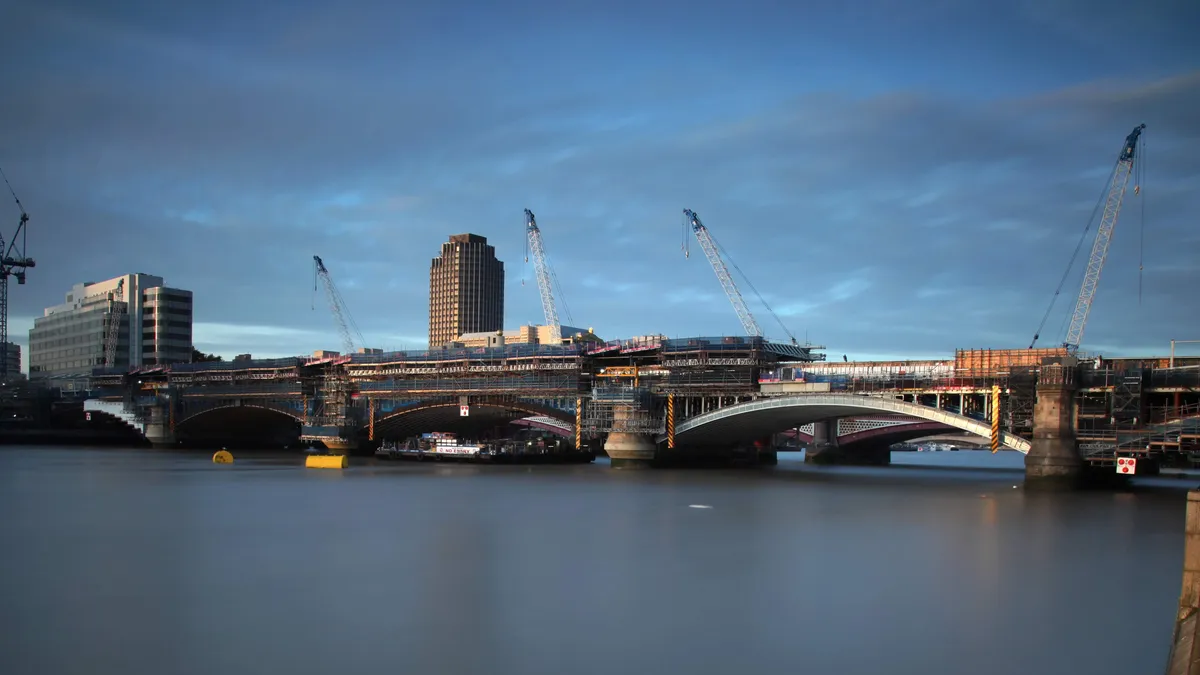Dive Brief:
- Balfour Beatty reported Thursday morning profits of $183 million (£139 million) for 2021, up markedly from $39.5 million in 2020. That's 28 cents a share versus about 6 cents.
- Revenue totaled $10.88 billion, down 3.8% from 2020. Profits from operations, however, rose 54% to $127.7 million.
- The company, whose U.S. chain of operations ranks 16th in ENR's Top 400 Contractors of 2021 list, said it planned to increase its stock buyback plans this year to $197.5 million. "If we buy back any more shares, there isn't going to be anything left for you to buy," CEO Leo Quinn jokingly told an analyst who asked about the company's cash on hand.
Dive Insight:
London-based Balfour Beatty said its U.S. profits from operations nearly doubled last year to $67.2 million. Shareholders responded positively, with the stock moving 5% higher in Thursday trading.
However, in December the firm pleaded guilty to one count of fraud and agreed to pay $65 million in fines and restitution to the U.S. Department of Justice for "lengthy and unnecessary delays" in maintenance to the military housing it operates.
On a call with stock analysts, Quinn said construction on the Microsoft campus in Seattle continues to be delayed because of a dispute between concrete workers and upper-level management in King County, Washington. Quinn said Microsoft instructed the company to lay off 900 workers, but assured analysts he expects the strike will be resolved in time.
Balfour Beatty is also working on the Los Angeles International Airport's Automatic People Mover and the electrification of the 52-mile Caltrain corridor between San Francisco and San Jose.
In the UK, the firm's operations lost $2.63 million last year, a large improvement from the $34.2 million loss recorded in 2020.
Quinn praised the "high quality" order book — the firm's backlog — as a good sign for the future. In particular, Quinn highlighted Britain's HS2 rail project as a sign that there was more opportunity for the company to grow and get involved with.
CFO Phil Harrison also said that the company would no longer bid for fixed price residential property projects in central London, emphasizing that the company's focus was on public sector infrastructure.
The firm has dialed back its fixed-price contracts to about 14% today, down from about 50% in 2018. These types of contracts expose contractors to the risk of additional costs, a particular pain point as the industry struggles with the problem of rising material and oil prices.
However, when asked by an analyst if there could be a future without lump-sum contracts, Quinn pushed back.
"If we got to zero fixed-price contracts, I'd contest that we're not taking enough risk in the portfolio," Quinn said. "It's healthy to have some fixed price work for two reasons. One is, it pushes you to your limit. But also it forces you to be very commercially strong. If everything was cost plus, you could get very lazy."
The company ended the year with about $882.6 million cash on hand, up from $693.2 million at the end of 2020.
"When we started 'Build to Last' all those years ago, we talked about creating a foundation for the next 100 years," Quinn said. "Well, this is the foundation we've created."













